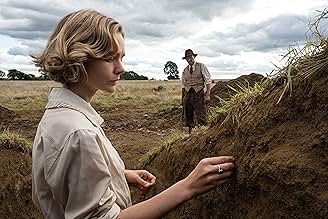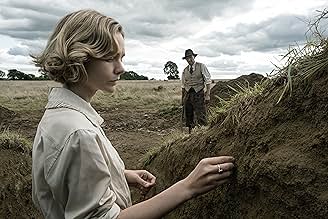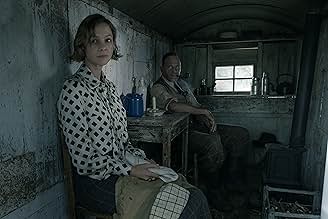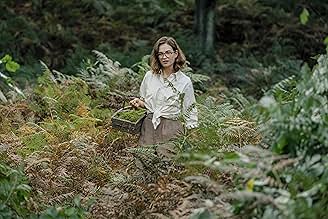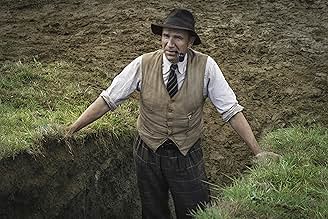A puertas de la Segunda Guerra Mundial, una viuda pudiente contrata a un arqueólogo aficionado para excavar túmulos funerarios en sus tierras.A puertas de la Segunda Guerra Mundial, una viuda pudiente contrata a un arqueólogo aficionado para excavar túmulos funerarios en sus tierras.A puertas de la Segunda Guerra Mundial, una viuda pudiente contrata a un arqueólogo aficionado para excavar túmulos funerarios en sus tierras.
- Nominada a5premios BAFTA
- 3 premios ganados y 11 nominaciones en total
- Dirección
- Guionistas
- Todo el elenco y el equipo
- Producción, taquilla y más en IMDbPro
Argumento
¿Sabías que…?
- TriviaReimagines the events of the 1939 excavation of Sutton Hoo near Woodbridge, in Suffolk, England. It is the site of two early medieval cemeteries that date from the 6th to 7th centuries. One cemetery had an undisturbed ship burial with a wealth of Anglo-Saxon artifacts. Most of these objects are now held by the British Museum.
- ErroresEdith's son Robert can be seen wearing an aluminium foil hat early in the movie, Aluminium foil did not surface until after the war, but tin foil had existed since the 19th century.
- Citas
Basil Brown: Robert, we all fail. Every day. There are some things we just can't succeed at no matter how hard we try. I know it's not what you want to hear.
- ConexionesFeatured in Jeremy Vine: Episode #4.25 (2021)
- Bandas sonorasLa Rejouissance (Allegro)
Written by George Frideric Handel
Public Domain
Arranged by Julian Kershaw
Performed by Alder Valley Brass
Opinión destacada
This is a very good movie..if you see the picture from the outside you'll say it's a story about an Archeologist and his historically important excavation..but if you dig deeper you'll find a lot of potential in what the movie is trying to tell you.
The relationships between us and the people we love,the people we don't even know..heck between people in general and how it's important to a human being..but that comes with a misunderstandings and conflicts and this happening in a time of war and how that is affecting them..all this has been told in an amazing dramatic way of Brasil Brown who discovered and excavated one of the most important archaeological discoveries of all time of course with that being the main story.
The acting by Carey Mulligan was magnificent and Ralph Fiennes was the one for this role and their performance was the outstanding thing in the whole movie.
Another thing was good is the editing..they've done a tremendous job and it was really worth the effort to come up with something like this.
Although sometimes there are some side stories that you'll find yourself not that interested in them too much,and the storytelling could seem very slow at some points..also there's ups and downs like any other movie.
Overall great movie,worth watching and i suggest you to see it.
- azizsalhi-56473
- 19 ene 2021
- Enlace permanente
Selecciones populares
Inicia sesión para calificar y agrega a la lista de videos para obtener recomendaciones personalizadas
- How long is The Dig?Con tecnología de Alexa
Detalles
- Fecha de lanzamiento
- Países de origen
- Sitio oficial
- Idioma
- También se conoce como
- The Dig
- Locaciones de filmación
- Productoras
- Ver más créditos de la compañía en IMDbPro
Taquilla
- Total a nivel mundial
- USD 693
- Tiempo de ejecución1 hora 52 minutos
- Color
- Mezcla de sonido
- Relación de aspecto
- 2.00 : 1
Contribuir a esta página
Sugiere una edición o agrega el contenido que falta







